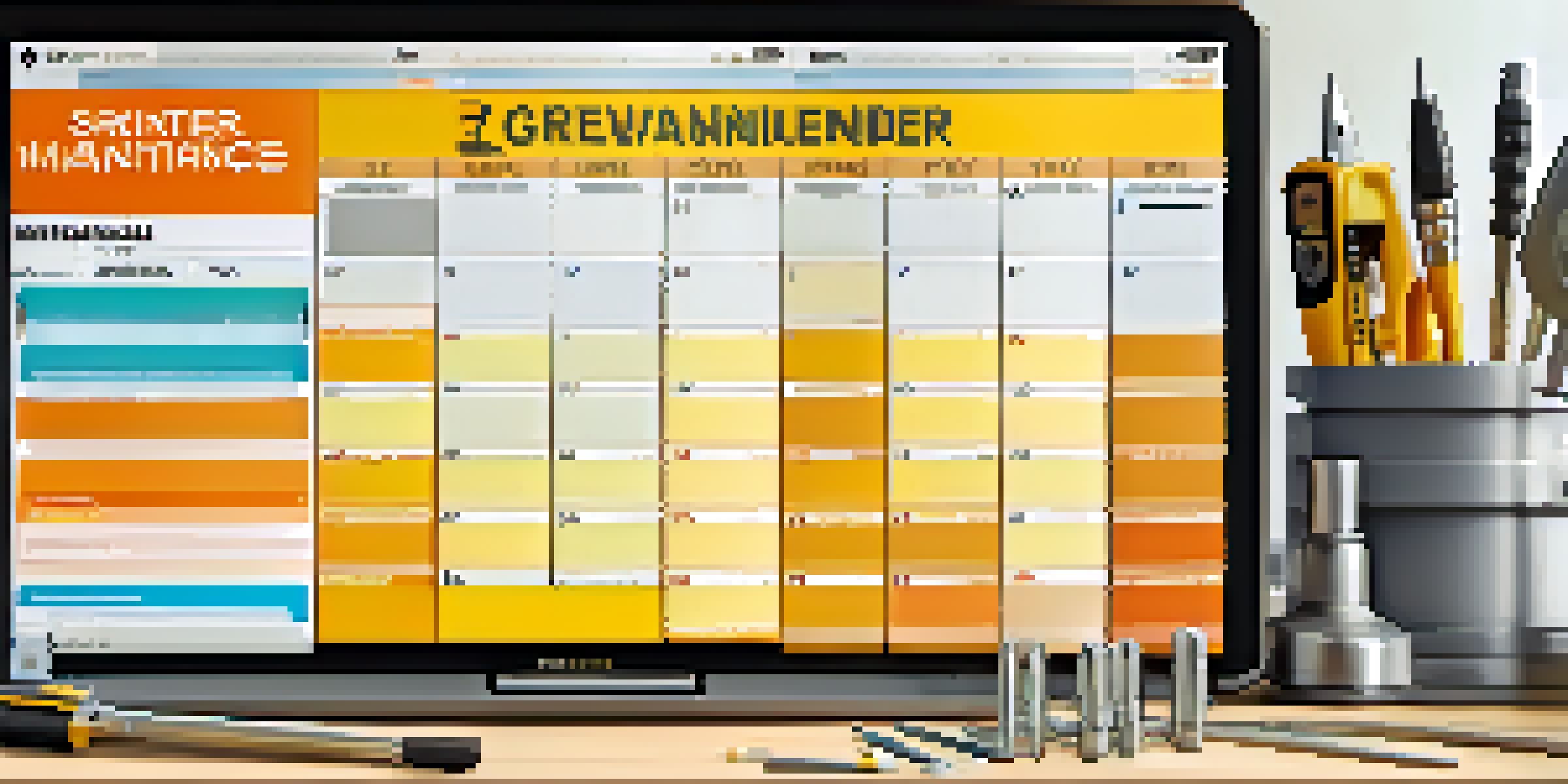Building a Maintenance Schedule for Rental Properties

Understanding the Importance of a Maintenance Schedule
A maintenance schedule is crucial for keeping your rental properties in tip-top shape. It not only helps preserve the value of your investment but also enhances tenant satisfaction. When tenants see that their landlord is proactive about property care, they are more likely to renew their leases and take better care of the unit themselves.
An ounce of prevention is worth a pound of cure.
Think of a maintenance schedule as a roadmap for property care. Just like regular car maintenance ensures that your vehicle runs smoothly, a consistent upkeep plan helps prevent costly repairs down the line. Ignoring maintenance can lead to bigger problems that might scare off potential tenants or drain your finances.
In essence, a solid maintenance schedule keeps your properties attractive and functional. It allows you to anticipate issues before they escalate, ensuring that both you and your tenants enjoy a hassle-free living experience.
Identifying Key Maintenance Tasks for Your Properties
To create an effective maintenance schedule, start by identifying the key tasks that need regular attention. These can include seasonal checks like HVAC servicing, gutter cleaning, and landscaping upkeep. Additionally, don’t forget about routine inspections of plumbing and electrical systems to prevent any unpleasant surprises.

Consider creating a checklist that outlines these tasks based on frequency—monthly, quarterly, or annually. For instance, changing air filters might be a monthly job, while checking smoke detectors could be a quarterly task. This structured approach makes it easier to stay organized and ensures nothing gets overlooked.
Importance of a Maintenance Schedule
A maintenance schedule preserves property value and enhances tenant satisfaction by preventing issues before they escalate.
Regular maintenance tasks not only keep properties in good condition but also foster a sense of responsibility among tenants. When they see that you’re invested in the upkeep of their home, they’re more inclined to report issues promptly, rather than waiting until they become major headaches.
Creating a Maintenance Calendar: The When and How
Once you've identified key tasks, the next step is to create a maintenance calendar. This calendar should outline when each task needs to be completed, allowing you to allocate time and resources effectively. For example, scheduling HVAC maintenance in the spring ensures that everything is in working order before the heat of summer kicks in.
Good maintenance is the cornerstone of a successful rental property.
Utilizing digital tools like Google Calendar or project management apps can streamline this process. Set reminders for yourself or your maintenance team, so you don’t miss important dates. Visual aids can be incredibly helpful in keeping track of your schedule, making it less likely for you to forget a task.
A well-structured maintenance calendar not only helps you stay organized but also serves as a communication tool with your tenants. Sharing this calendar with them can set clear expectations about when maintenance will occur, leading to better tenant relationships.
Budgeting for Maintenance: Planning for Expenses
Budgeting for maintenance is a crucial part of rental property management. It’s important to set aside a specific amount each month to cover routine maintenance and unexpected repairs. A good rule of thumb is to allocate about 1-2% of the property’s value annually for maintenance costs.
By planning your budget in advance, you avoid the stress of scrambling for funds when an urgent repair arises. Remember, it’s not just about the big expenses; even small, regular costs can add up over time. Having a financial cushion allows you to address issues promptly, keeping your property in great shape.
Budgeting for Maintenance Costs
Setting aside funds for routine and unexpected repairs ensures you can address issues promptly and maintain property condition.
Additionally, being transparent about your maintenance budget can foster trust with your tenants. When they see that you’re serious about maintaining the property, they are more likely to respect it and contribute positively to the rental experience.
Hiring the Right Professionals for Maintenance Tasks
While some maintenance tasks can be handled in-house, others require the expertise of professionals. Hiring qualified contractors for plumbing, electrical work, or major renovations is essential to ensure safety and compliance with regulations. Researching local service providers and reading reviews can help you find reliable professionals.
Establishing a good relationship with your maintenance team can lead to better service and potentially lower costs. Many contractors appreciate consistent work and may offer discounts for repeat business. This can be a win-win situation for both parties, ensuring your properties remain in excellent condition without breaking the bank.
Moreover, having a go-to list of trusted professionals allows you to respond quickly to emergencies. Your tenants will appreciate the promptness, which can lead to higher satisfaction and a positive rental experience.
Tracking Maintenance Tasks and Their Effectiveness
Tracking completed maintenance tasks is vital for understanding what works and what doesn’t. Keep records of when tasks were performed, who completed them, and any issues that arose. This information can provide insights into patterns that may require more attention or different approaches in the future.
Using property management software can simplify this process. Many tools offer features for tracking maintenance requests, scheduling tasks, and even generating reports on past work. With this data, you can make informed decisions about where to allocate your maintenance budget or which tasks need more frequent attention.
Effective Communication with Tenants
Clear communication about maintenance schedules fosters tenant engagement and encourages prompt reporting of issues.
Additionally, tracking the effectiveness of your maintenance schedule can help you refine it over time. If certain issues keep recurring, it might indicate a need for a deeper investigation or a change in how you approach maintenance.
Communicating with Tenants About Maintenance Schedules
Clear communication with your tenants about the maintenance schedule is key to a smooth rental experience. Make sure they understand the importance of regular maintenance and how it benefits them. This can help cultivate a culture of care and responsibility within your rental properties.
Consider sending out a copy of the maintenance calendar or regular updates about upcoming tasks. This proactive approach allows tenants to prepare for any necessary adjustments in their daily routines. For instance, if you need to perform pest control, giving them a heads-up ensures they can make arrangements for their pets or personal schedules.

Open lines of communication can also encourage tenants to report issues promptly. When they feel informed and engaged in the maintenance process, they are more likely to take ownership of their living environment, leading to a better overall experience for everyone involved.